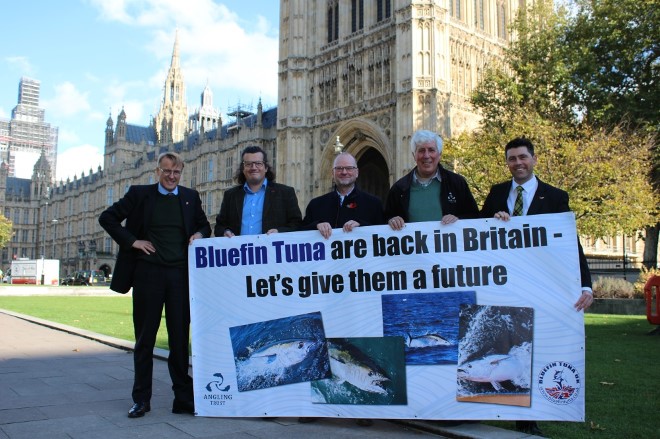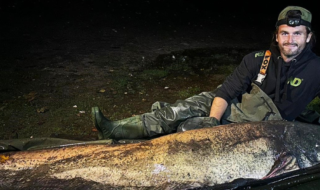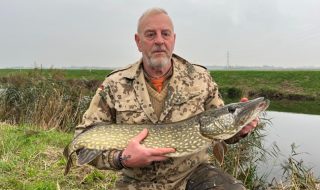This week representatives of the Angling Trust and the campaign group Bluefin Tuna UK met with supportive MPs at the House of Commons to launch a joint campaign to establish a properly regulated, science-based, live-release UK tuna fishery which would be world-leading and would set a new benchmark for how such fisheries should be managed worldwide.
Over the last three yers, huge Atlantic bluefin tuna have appeared late each summer in UK waters. The International Commission for the Conservation of Atlantic Tuna (ICCAT) began a stock recovery program in 2007 which has seen numbers recover sharply from the danger levels of 10 years ago. From Cornwall and Wales to the Outer Hebrides, these unique fish are now present in unprecedented numbers. Dozens of fish up to 320kg have been hooked accidentally, and released safely, by anglers fishing for sharks.
Until the 1950s the UK had a thriving and high-value recreational bluefin tuna fishery operating mainly out of Scarborough under the auspices of the British Tunny Club. Commercial overfishing of both herring and tuna saw stocks collapse forcing big game anglers to spend a small fortune pursuing these magnificent fish overseas rather than supporting the tourist economy back in Britain.
The campaigners believe a live-release recreational fishery could help many deprived coastal communities in the UK to reinvent themselves as world-class bluefin tuna angling destinations attracting overseas visitors spending millions of pounds supporting much needed jobs and businesses in the process. In response to the stock revival ICCAT is increasing the global quota from a low point of 12,000 tonnes to 38,350 by 2020. The EU is a member of ICCAT and has 16,000 tonne quota – all but 1-2 per cent of which is allocated to commercial interests predominantly in Spain, Italy and France.
ICCAT requires member states to allocate a proportion of their quota for the purposes of sports or recreational fishing. In common with Ireland, Denmark and Sweden the UK has no share of this EU quota and is therefore unable to fish for them either commercially or recreationally.
Brexit Opportunity
Once Britain leaves the EU anglers are calling on the UK government to apply to ICCAT for part of the ‘reserve’ quota held for new ‘artisanal’ fishery opportunities. As well as the huge economic and employment impacts this new UK fishery could contribute significantly to existing science based research program aimed at increasing our knowledge of this iconic and highly migratory game fish.
Steve Murphy, Director of Bluefin Tuna UK said: “We are proposing the introduction of a licensed fishery for recreational anglers which would control the number of vessels deliberately targeting tuna along with a mandatory reporting and monitoring system. Controls on the tackle would help ensure the best fish welfare conditions in order to limit mortality, although this remains remarkably low at less than 5 per cent. This fishery would set a new benchmark in sustainable management of a recovering species. putting the interests of the fish at its heart and contributing to the government’s ambition in its 25 Year Environment Plan for the UK to develop world-leading fisheries management.
“There are currently tagging programs taking place across Europe using recreational angling to gather much needed scientific data to help understand the stock better. A large-scale research program, as part of any UK live release fishery, would allow anglers to contribute to essential scientific research of the stock and its future management.”
David Mitchell, Head of Marine at the Angling Trust said: “The return of giant Bluefin Tuna to our shores provides the UK with a once in a generation opportunity to establish a sustainable, economically optimal, scientifically important fishery for bluefin tuna right here in Britain. The authorised involvement of committed and conservation minded anglers in the fishery would not only add significantly to our knowledge of these tremendous fish but would guard against moves to reinstate unsustainable commercial harvesting and the inevitable illegal fishing that would occur if no one was looking out for the stocks.
“A live release recreational fishery would be a win-win-win by contributing to better science, allowing the rebuilding and recovery of the population and delivering huge economic and employment benefits to coastal communities from Cornwall to the West coast of Scotland.”
Keen Angler and North Cornwall MP Scott Mann said: “It has been nothing short of fabulous to see these huge and iconic creatures aggregating off the Cornish coast in recent years. It would be a massive boost to our coastal communities if the government was to take up these proposals and allow local anglers to enjoy world class catch and release big game fishing right on our doorsteps. I would love nothing more than to be able to lure mad keen anglers away from Florida and Mexico in favour of the Cornish Riviera!”






